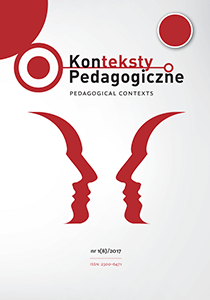Abstract
The article presents the results of a survey conducted among high school students. It discusses the impressions and reflections of the researched students who participated in the school exam conducted by the university stu-dents. Respondents provide features that should characterize a creative young teacher among which the most important is creativity, conducting classes in an interesting way, good contact with pupils, openness to ideas of learners, and the ability to interest them with the content of the lesson.
References
Bowkett, S. (2000). Wyobraź sobie, że... ćwiczenia rozwijające myślenie twórcze uczniów. Warszawa: WSiP. Denek, K. (2003). Podmiotowość w procesie kształcenia. Wychowanie na co Dzień, 10–11.
Hamer, H. (1994). Klucz do efektywności nauczania. Warszawa: Veda.
Komorowska, H. (2007). Metodyka nauczania języków obcych w Polsce (1957–2007). Warszawa: CODN.
Kowalikowa, J. (1996). Język nauczycieli i ucznia w komunikacji szkolnej. Szczecin: Materiały Konferencji Naukowej.
Kwiatkowska-Ratajczak, M. (2011) (red.). Innowacje i metody. W kręgu teorii i praktyki. Podręcznik akademicki dydaktyki kształcenia polonistycznego. T. 1. Poznań: Wydaw-nictwo Naukowe UAM.
Nęcka, E. (1998). Trening twórczości. Podręcznik dla psychologów, pedagogów i nauczycieli. Kraków: Impuls.
Romanowska, D., Lis, E. (2015). Tabletowe dzieci. Newsweek Polska, 31.
Skrzypczak, J. (2000) (red.). Popularna encyklopedia mass mediów. Poznań: Kurpisz.
Szmidt, K.J. (1994). Elementarz twórczego życia, czyli o sposobach twórczego myślenia i działania. Warszawa: WSiP.
Szmidt, K.J. (2012). Pedagogika twórczości. Gdańsk: GWP.
Uszyńska-Jarmoc, J., Kunat, B., Tarasiuk, M.J. (2014). Sukcesy uczniów zdolnych. Fakty ‒ narracje ‒ interpretacje. Białystok: Centrum Kształcenia Ustawicznego.
Walczak, D. (2011). Bilans kompetencji początkujących nauczycieli – przedstawienie wyników badań początkujących nauczycieli. Warszawa: IBE.
Wróblewski, M. (2014). Polonistyka szkolna, polonistyka uniwersytecka wobec prze-mian kulturowych i cywilizacyjnych. W: K. Biedrzycki i in. (red.), Polonistyka dziś – kształcenie dla jutra. Kraków: Universitas.
In accordance with the recommendation of the Ministry of Science and Higher Education, which aims to counteract the practice of “ghostwriting” and “guest authorship,” all authors submitting their text for publication should attach an author’s statement which declares the contribution of each of the authors to the article. The printed and signed statement should be delivered by mail or other means to editor-in-chief Joanna Skibska or sent in the form of a scan to the following e-mail address: redakcja@kontekstypedagogczne.pl. The authors will not receive remuneration for publishing their papers. The editors reserve the right to make minor editorial changes to the articles which will not affect the substance of the article. We encourage all authors to prepare their articles in accordance with the guidelines for manuscript preparation. Download pdf file.
Authors transfer all copyrights and grant the journal the right of first publication with the work simultaneously licensed under a Creative Commons Attribution License that allows others to share the work with acknowledgement of the work's authorship and initial publication in this journal. All authors agree to the publishing of their email addresses, affiliations and short bio statements with their articles during the submission process.

